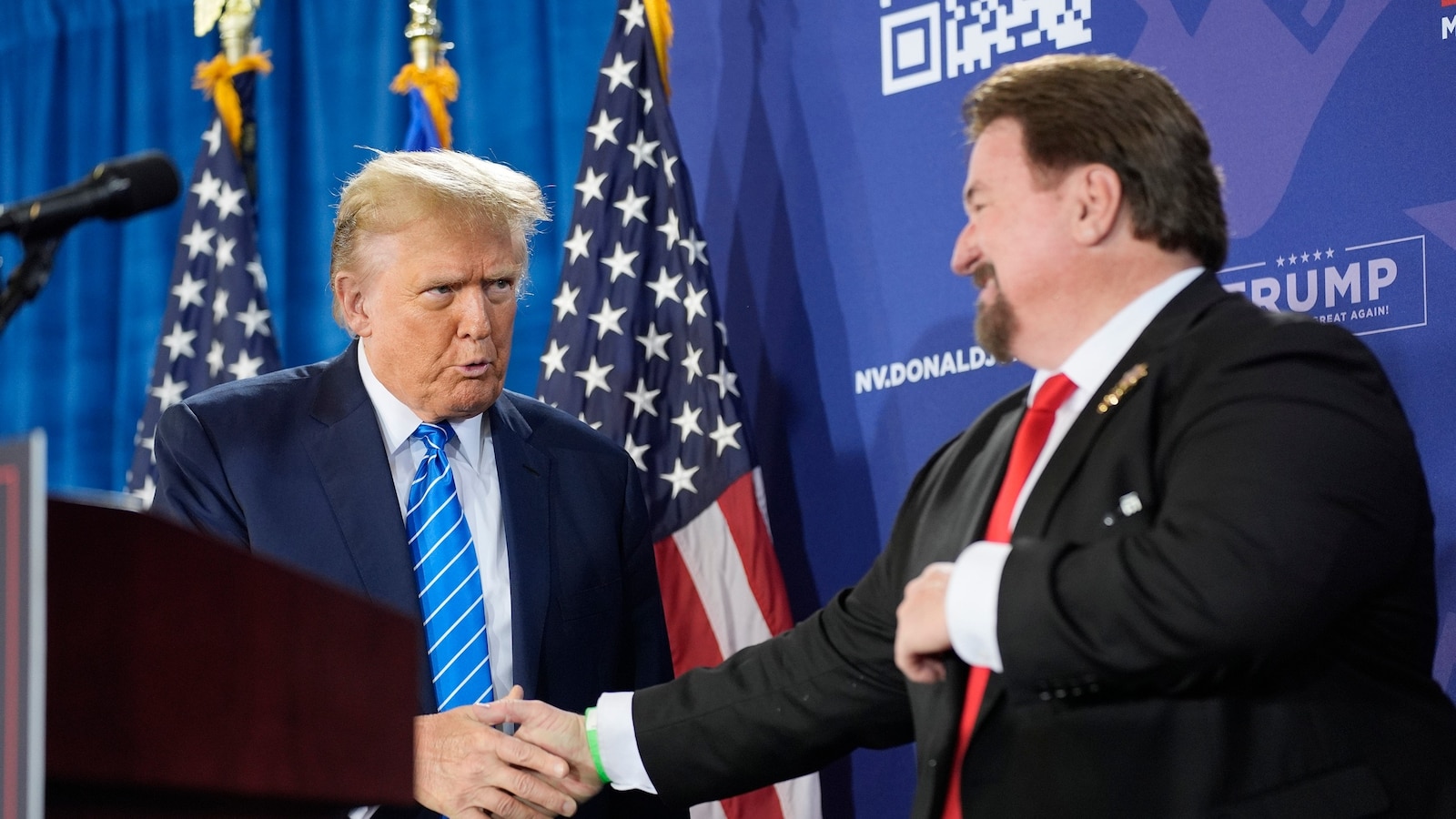More than a dozen Republican officials who signed false certifications claiming Donald Trump had won their states’ electoral votes in the 2020 election are set to serve as electors Tuesday, this time casting real votes for the president-elect.
Thirteen “fake electors” will cast Electoral College votes in Pennsylvania, Nevada and Michigan despite some of the officials still facing criminal charges from the last election.
As part of a process cemented in the Constitution as well as local laws, presidential electors across the country are meeting Tuesday to cast their Electoral College votes, finalizing Trump’s victory. Trump has been projected to get 312 electoral votes, while Vice President Kamala Harris has been projected to get 226.

In this Jan. 27, 2024, file photo, Nevada GOP chair Michael McDonald, right, shakes hands with Republican presidential candidate former President Donald Trump at a campaign event in Las Vegas.
John Locher/AP, FILE
When the same process played out four years ago, with 306 electoral votes going to President Joe Biden, Trump and his allies allegedly organized false slates of electors in seven states as part of a scheme to overturn the election, according to a federal indictment charging Trump for his conduct.
Mimicking the procedures followed by legitimate electors, the fake electors met on the same day as the real electors but signed false certifications declaring Trump the winner. Some of the electors allegedly knowingly signed the false certificates to influence the results, while others were misled by Trump and his allies, who said the certificates would only be used if Trump’s lawsuits alleging widespread voter fraud were successful.

In this Dec. 18, 2023, file photo, Republican electors James Hindle III, top left, Shawn Meehan, James DeGraffenreld, bottom left, Jessie Law, Nevada Republican Party Chairman Michael McDonald, right, and Eileen Rice, not photographed, appear remotely for their initial arraignment at the Regional Justice Center, in Las Vegas.
Las Vegas Review-Journal/TNS via Getty Images, FILE
To determine overlap, ABC News reviewed the 2020 fake elector certificates with the current list of electors by either the state parties or state elections offices.
In Nevada, two fake electors, both of whom were indicted on charges of falsely declaring Trump the winner of Nevada’s electoral votes in 2020, participated as electors on Tuesday.
Nevada Attorney General Aaron Ford refiled his charges against six Republican fake electors last week after a judge dismissed the original case over a venue issue.
In Michigan, six of the 2020 so-called fake electors returned to cast electoral votes on Tuesday.
The returning electors are all facing felony charges over the 2020 scheme and are awaiting a judge’s ruling regarding whether the case will proceed to trial. They have all pleaded not guilty.
In Pennsylvania, five of the certified presidential electors for 2024 are also people who signed the fake elector certificate in 2020. No criminal charges have been filed against Pennsylvania’s fake electors.

In this file photo, a person holds the certificate of votes from the commonwealth of Pennsylvania during a joint session of Congress after the session resumed following protests at the US Capitol in Washington, D.C., early on Jan. 7, 2021.
Saul Loeb/AFP via Getty Images, FILE
Rex VanMiddlesworth, a constitutional legal expert and board member of the nonpartisan civic education and elections group Keep Our Republic, told ABC News that the participation of the so-called fake electors could reflect the current state of the Republican Party.
“I think it’s evidence of how deeply ingrained in the Republican Party the belief that the election was stolen in 2020 — and so it’s not a disqualifier in the party. If anything, it’s a badge of honor in the party to have stood up and fought the results of the 2020 election,” he said.
Following Biden being declared the winner in 2020, Trump filed lawsuits in several battleground states in an attempt to overturn the election results, arguing the election was “stolen.” However, though his lawsuits led to the 2020 election results being contested in court, his claims proved to be unfounded.
VanMiddlesworth, who co-chairs the organization’s anti-subversion task force, said there are relatively limited requirements to be an elector and that there likely are no legal issues against the electors participating again, even those who face charges. He emphasized as well that the Electoral Count Reform and Presidential Transition Improvement Act, passed in 2022, made the Electoral College process much clearer and in part has contributed to a smoother certification process this year.
“The job of the electors is to vote for whoever their state voted for,” VanMiddlesworth said. “Truthfully, their identity shouldn’t affect that and should not matter.”
He added that “there’s nothing really untoward this year about what they’re doing,” as they are set to vote properly for whom their states voted for.
Prosecutors in Georgia, Nevada, Arizona and Wisconsin brought criminal cases against some of the fake electors, though many of the cases have been beset by issues.
The criminal case in Georgia against Trump and multiple defendants, including three fake electors, has been stalled since June while an appeals court considers the former president’s challenge to Judge Scott McAfee’s decision not to disqualify Fulton County District Attorney Fani Willis over a relationship with a prosecutor. The judge overseeing the Arizona fake electors case recused himself after he told fellow judges to respond to attacks against Vice President Kamala Harris. The Nevada fake electors case was dismissed earlier this year over a venue issue, though the state’s attorney general refiled the case in a different county.

